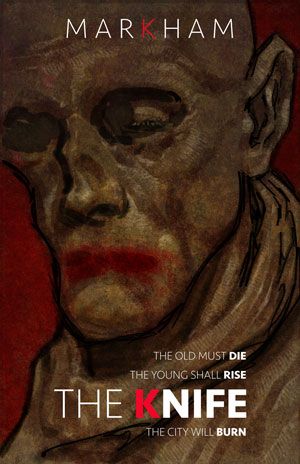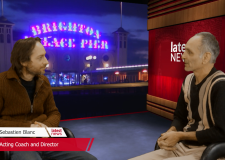Vanessa Austin Locke: The Knife – the Trainspotting of supernatural prose
I read somewhere a while ago that during times of recession and social depression vampires and other fantasy material becomes big business. Something about escapism. Well that certainly seems to have been the case over the last six years or so. But who doesn’t love vampires? Well, me actually. It’s not that I don’t like them, but I got bored of them in my late teens after the 17th viewing of Bram Stoker’s Dracula.

Then, about 18 months ago, I edited a book for a new writer, and lo and behold, it was about vampires. I poured myself a coffee and settled in for a couple of dull days. By the end of chapter two my coffee was untouched and cold beside me. This wasn’t about vampires at all. It was about the emerging social underclass in the UK. It was about knife crime. It was about the London riots. It was about the social neglect that led to the murders of Baby P, James Bulger and Damilola Taylor. And it stirred me. Sure there were vampires, but what a perfect use of them as a metaphor for the things that have made so many of us angry with or apathetic about our governments of late.
After I’d read it I wanted to question the author, Lee Markham, about his decision to use such bone-close representations of the children that had lost their lives in what was, essentially, a fantasy novel. It wasn’t that I thought he should change it, but I wanted to know that his motives were pure. The book was recently published by no man, so I went back through my emails to see if I could find his answer to my question. I did.
“I gave a lot of thought to whether it was acceptable to feature such close facsimiles of Baby P, Damilola Taylor, or Jon Venables and Bobby Thompson and came to the conclusion that they could only be featured if they were not exploited. I hope the story is in its own small way a prayer to move away from the blame culture that, in the end, only serves to give sanctuary to the neglect they endured.”
“This wasn’t about vampires at all. It was about knife crime”
I’m re-reading the book at the moment, which has since had cover artwork contributed by Liam Sharp, the famed comic book artist, who has called it “The Trainspotting of supernatural prose.” What’s striking me this time is how Markham manages to stay away from blame culture even as a writer. Concepts like good and evil don’t really exist for him, even with vampires. There’s a lot of violence in it, but there’s shading behind it, there’s context and there’s understanding. I think pathos is the most important ingredient for any writer of any genre to include in their work, and The Knife is dripping with it.
I’m writing this on the eve of our European elections. I pray that those who are about to be voted into power endeavor to deserve their positions, raise up our underclass before they rise up on their own in anger and desperation again, and build a better society for us all, because – and I know I’m not alone here – I’ve forgotten what the point of politicians is.
The Knife was published by No Man in 2013 and is available from Amazon and Barnes & Noble. Visit the publisher’s website for more information on this fearsome read: www.no-man.org





















